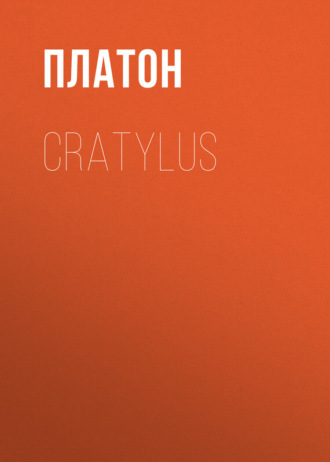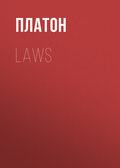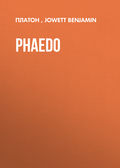
Платон
Cratylus
Language is an aspect of man, of nature, and of nations, the transfiguration of the world in thought, the meeting-point of the physical and mental sciences, and also the mirror in which they are reflected, present at every moment to the individual, and yet having a sort of eternal or universal nature. When we analyze our own mental processes, we find words everywhere in every degree of clearness and consistency, fading away in dreams and more like pictures, rapidly succeeding one another in our waking thoughts, attaining a greater distinctness and consecutiveness in speech, and a greater still in writing, taking the place of one another when we try to become emancipated from their influence. For in all processes of the mind which are conscious we are talking to ourselves; the attempt to think without words is a mere illusion, – they are always reappearing when we fix our thoughts. And speech is not a separate faculty, but the expression of all our faculties, to which all our other powers of expression, signs, looks, gestures, lend their aid, of which the instrument is not the tongue only, but more than half the human frame.
The minds of men are sometimes carried on to think of their lives and of their actions as links in a chain of causes and effects going back to the beginning of time. A few have seemed to lose the sense of their own individuality in the universal cause or nature. In like manner we might think of the words which we daily use, as derived from the first speech of man, and of all the languages in the world, as the expressions or varieties of a single force or life of language of which the thoughts of men are the accident. Such a conception enables us to grasp the power and wonder of languages, and is very natural to the scientific philologist. For he, like the metaphysician, believes in the reality of that which absorbs his own mind. Nor do we deny the enormous influence which language has exercised over thought. Fixed words, like fixed ideas, have often governed the world. But in such representations we attribute to language too much the nature of a cause, and too little of an effect, – too much of an absolute, too little of a relative character, – too much of an ideal, too little of a matter-of-fact existence.
Or again, we may frame a single abstract notion of language of which all existent languages may be supposed to be the perversion. But we must not conceive that this logical figment had ever a real existence, or is anything more than an effort of the mind to give unity to infinitely various phenomena. There is no abstract language 'in rerum natura,' any more than there is an abstract tree, but only languages in various stages of growth, maturity, and decay. Nor do other logical distinctions or even grammatical exactly correspond to the facts of language; for they too are attempts to give unity and regularity to a subject which is partly irregular.
We find, however, that there are distinctions of another kind by which this vast field of language admits of being mapped out. There is the distinction between biliteral and triliteral roots, and the various inflexions which accompany them; between the mere mechanical cohesion of sounds or words, and the 'chemical' combination of them into a new word; there is the distinction between languages which have had a free and full development of their organisms, and languages which have been stunted in their growth, – lamed in their hands or feet, and never able to acquire afterwards the powers in which they are deficient; there is the distinction between synthetical languages like Greek and Latin, which have retained their inflexions, and analytical languages like English or French, which have lost them. Innumerable as are the languages and dialects of mankind, there are comparatively few classes to which they can be referred.
Another road through this chaos is provided by the physiology of speech. The organs of language are the same in all mankind, and are only capable of uttering a certain number of sounds. Every man has tongue, teeth, lips, palate, throat, mouth, which he may close or open, and adapt in various ways; making, first, vowels and consonants; and secondly, other classes of letters. The elements of all speech, like the elements of the musical scale, are few and simple, though admitting of infinite gradations and combinations. Whatever slight differences exist in the use or formation of these organs, owing to climate or the sense of euphony or other causes, they are as nothing compared with their agreement. Here then is a real basis of unity in the study of philology, unlike that imaginary abstract unity of which we were just now speaking.
Whether we regard language from the psychological, or historical, or physiological point of view, the materials of our knowledge are inexhaustible. The comparisons of children learning to speak, of barbarous nations, of musical notes, of the cries of animals, of the song of birds, increase our insight into the nature of human speech. Many observations which would otherwise have escaped us are suggested by them. But they do not explain why, in man and in man only, the speaker met with a response from the hearer, and the half articulate sound gradually developed into Sanscrit and Greek. They hardly enable us to approach any nearer the secret of the origin of language, which, like some of the other great secrets of nature, – the origin of birth and death, or of animal life, – remains inviolable. That problem is indissolubly bound up with the origin of man; and if we ever know more of the one, we may expect to know more of the other. (Compare W. Humboldt, 'Ueber die Verschiedenheit des menschlichen Sprachbaues;' M. Muller, 'Lectures on the Science of Language;' Steinthal, 'Einleitung in die Psychologie und Sprachwissenschaft.')
It is more than sixteen years since the preceding remarks were written, which with a few alterations have now been reprinted. During the interval the progress of philology has been very great. More languages have been compared; the inner structure of language has been laid bare; the relations of sounds have been more accurately discriminated; the manner in which dialects affect or are affected by the literary or principal form of a language is better understood. Many merely verbal questions have been eliminated; the remains of the old traditional methods have died away. The study has passed from the metaphysical into an historical stage. Grammar is no longer confused with language, nor the anatomy of words and sentences with their life and use. Figures of speech, by which the vagueness of theories is often concealed, have been stripped off; and we see language more as it truly was. The immensity of the subject is gradually revealed to us, and the reign of law becomes apparent. Yet the law is but partially seen; the traces of it are often lost in the distance. For languages have a natural but not a perfect growth; like other creations of nature into which the will of man enters, they are full of what we term accident and irregularity. And the difficulties of the subject become not less, but greater, as we proceed – it is one of those studies in which we seem to know less as we know more; partly because we are no longer satisfied with the vague and superficial ideas of it which prevailed fifty years ago; partly also because the remains of the languages with which we are acquainted always were, and if they are still living, are, in a state of transition; and thirdly, because there are lacunae in our knowledge of them which can never be filled up. Not a tenth, not a hundredth part of them has been preserved. Yet the materials at our disposal are far greater than any individual can use. Such are a few of the general reflections which the present state of philology calls up.
(1) Language seems to be composite, but into its first elements the philologer has never been able to penetrate. However far he goes back, he never arrives at the beginning; or rather, as in Geology or in Astronomy, there is no beginning. He is too apt to suppose that by breaking up the existing forms of language into their parts he will arrive at a previous stage of it, but he is merely analyzing what never existed, or is never known to have existed, except in a composite form. He may divide nouns and verbs into roots and inflexions, but he has no evidence which will show that the omega of tupto or the mu of tithemi, though analogous to ego, me, either became pronouns or were generated out of pronouns. To say that 'pronouns, like ripe fruit, dropped out of verbs,' is a misleading figure of speech. Although all languages have some common principles, there is no primitive form or forms of language known to us, or to be reasonably imagined, from which they are all descended. No inference can be drawn from language, either for or against the unity of the human race. Nor is there any proof that words were ever used without any relation to each other. Whatever may be the meaning of a sentence or a word when applied to primitive language, it is probable that the sentence is more akin to the original form than the word, and that the later stage of language is the result rather of analysis than of synthesis, or possibly is a combination of the two. Nor, again, are we sure that the original process of learning to speak was the same in different places or among different races of men. It may have been slower with some, quicker with others. Some tribes may have used shorter, others longer words or cries: they may have been more or less inclined to agglutinate or to decompose them: they may have modified them by the use of prefixes, suffixes, infixes; by the lengthening and strengthening of vowels or by the shortening and weakening of them, by the condensation or rarefaction of consonants. But who gave to language these primeval laws; or why one race has triliteral, another biliteral roots; or why in some members of a group of languages b becomes p, or d, t, or ch, k; or why two languages resemble one another in certain parts of their structure and differ in others; or why in one language there is a greater development of vowels, in another of consonants, and the like – are questions of which we only 'entertain conjecture.' We must remember the length of time that has elapsed since man first walked upon the earth, and that in this vast but unknown period every variety of language may have been in process of formation and decay, many times over.
(Compare Plato, Laws): —
'ATHENIAN STRANGER: And what then is to be regarded as the origin of government? Will not a man be able to judge best from a point of view in which he may behold the progress of states and their transitions to good and evil?
CLEINIAS: What do you mean?
ATHENIAN STRANGER: I mean that he might watch them from the point of view of time, and observe the changes which take place in them during infinite ages.
CLEINIAS: How so?
ATHENIAN STRANGER: Why, do you think that you can reckon the time which has elapsed since cities first existed and men were citizens of them?
CLEINIAS: Hardly.
ATHENIAN STRANGER: But you are quite sure that it must be vast and incalculable?
CLEINIAS: No doubt.
ATHENIAN STRANGER: And have there not been thousands and thousands of cities which have come into being and perished during this period? And has not every place had endless forms of government, and been sometimes rising, and at other times falling, and again improving or waning?'
Aristot. Metaph.: —
'And if a person should conceive the tales of mythology to mean only that men thought the gods to be the first essences of things, he would deem the reflection to have been inspired and would consider that, whereas probably every art and part of wisdom had been DISCOVERED AND LOST MANY TIMES OVER, such notions were but a remnant of the past which has survived to our day.')
It can hardly be supposed that any traces of an original language still survive, any more than of the first huts or buildings which were constructed by man. Nor are we at all certain of the relation, if any, in which the greater families of languages stand to each other. The influence of individuals must always have been a disturbing element. Like great writers in later times, there may have been many a barbaric genius who taught the men of his tribe to sing or speak, showing them by example how to continue or divide their words, charming their souls with rhythm and accent and intonation, finding in familiar objects the expression of their confused fancies – to whom the whole of language might in truth be said to be a figure of speech. One person may have introduced a new custom into the formation or pronunciation of a word; he may have been imitated by others, and the custom, or form, or accent, or quantity, or rhyme which he introduced in a single word may have become the type on which many other words or inflexions of words were framed, and may have quickly ran through a whole language. For like the other gifts which nature has bestowed upon man, that of speech has been conveyed to him through the medium, not of the many, but of the few, who were his 'law-givers' – 'the legislator with the dialectician standing on his right hand,' in Plato's striking image, who formed the manners of men and gave them customs, whose voice and look and behaviour, whose gesticulations and other peculiarities were instinctively imitated by them, – the 'king of men' who was their priest, almost their God…But these are conjectures only: so little do we know of the origin of language that the real scholar is indisposed to touch the subject at all.
(2) There are other errors besides the figment of a primitive or original language which it is time to leave behind us. We no longer divide languages into synthetical and analytical, or suppose similarity of structure to be the safe or only guide to the affinities of them. We do not confuse the parts of speech with the categories of Logic. Nor do we conceive languages any more than civilisations to be in a state of dissolution; they do not easily pass away, but are far more tenacious of life than the tribes by whom they are spoken. 'Where two or three are gathered together,' they survive. As in the human frame, as in the state, there is a principle of renovation as well as of decay which is at work in all of them. Neither do we suppose them to be invented by the wit of man. With few exceptions, e.g. technical words or words newly imported from a foreign language, and the like, in which art has imitated nature, 'words are not made but grow.' Nor do we attribute to them a supernatural origin. The law which regulates them is like the law which governs the circulation of the blood, or the rising of the sap in trees; the action of it is uniform, but the result, which appears in the superficial forms of men and animals or in the leaves of trees, is an endless profusion and variety. The laws of vegetation are invariable, but no two plants, no two leaves of the forest are precisely the same. The laws of language are invariable, but no two languages are alike, no two words have exactly the same meaning. No two sounds are exactly of the same quality, or give precisely the same impression.
It would be well if there were a similar consensus about some other points which appear to be still in dispute. Is language conscious or unconscious? In speaking or writing have we present to our minds the meaning or the sound or the construction of the words which we are using? – No more than the separate drops of water with which we quench our thirst are present: the whole draught may be conscious, but not the minute particles of which it is made up: So the whole sentence may be conscious, but the several words, syllables, letters are not thought of separately when we are uttering them. Like other natural operations, the process of speech, when most perfect, is least observed by us. We do not pause at each mouthful to dwell upon the taste of it: nor has the speaker time to ask himself the comparative merits of different modes of expression while he is uttering them. There are many things in the use of language which may be observed from without, but which cannot be explained from within. Consciousness carries us but a little way in the investigation of the mind; it is not the faculty of internal observation, but only the dim light which makes such observation possible. What is supposed to be our consciousness of language is really only the analysis of it, and this analysis admits of innumerable degrees. But would it not be better if this term, which is so misleading, and yet has played so great a part in mental science, were either banished or used only with the distinct meaning of 'attention to our own minds,' such as is called forth, not by familiar mental processes, but by the interruption of them? Now in this sense we may truly say that we are not conscious of ordinary speech, though we are commonly roused to attention by the misuse or mispronunciation of a word. Still less, even in schools and academies, do we ever attempt to invent new words or to alter the meaning of old ones, except in the case, mentioned above, of technical or borrowed words which are artificially made or imported because a need of them is felt. Neither in our own nor in any other age has the conscious effort of reflection in man contributed in an appreciable degree to the formation of language. 'Which of us by taking thought' can make new words or constructions? Reflection is the least of the causes by which language is affected, and is likely to have the least power, when the linguistic instinct is greatest, as in young children and in the infancy of nations.
A kindred error is the separation of the phonetic from the mental element of language; they are really inseparable – no definite line can be drawn between them, any more than in any other common act of mind and body. It is true that within certain limits we possess the power of varying sounds by opening and closing the mouth, by touching the palate or the teeth with the tongue, by lengthening or shortening the vocal instrument, by greater or less stress, by a higher or lower pitch of the voice, and we can substitute one note or accent for another. But behind the organs of speech and their action there remains the informing mind, which sets them in motion and works together with them. And behind the great structure of human speech and the lesser varieties of language which arise out of the many degrees and kinds of human intercourse, there is also the unknown or over-ruling law of God or nature which gives order to it in its infinite greatness, and variety in its infinitesimal minuteness – both equally inscrutable to us. We need no longer discuss whether philology is to be classed with the Natural or the Mental sciences, if we frankly recognize that, like all the sciences which are concerned with man, it has a double aspect, – inward and outward; and that the inward can only be known through the outward. Neither need we raise the question whether the laws of language, like the other laws of human action, admit of exceptions. The answer in all cases is the same – that the laws of nature are uniform, though the consistency or continuity of them is not always perceptible to us. The superficial appearances of language, as of nature, are irregular, but we do not therefore deny their deeper uniformity. The comparison of the growth of language in the individual and in the nation cannot be wholly discarded, for nations are made up of individuals. But in this, as in the other political sciences, we must distinguish between collective and individual actions or processes, and not attribute to the one what belongs to the other. Again, when we speak of the hereditary or paternity of a language, we must remember that the parents are alive as well as the children, and that all the preceding generations survive (after a manner) in the latest form of it. And when, for the purposes of comparison, we form into groups the roots or terminations of words, we should not forget how casual is the manner in which their resemblances have arisen – they were not first written down by a grammarian in the paradigms of a grammar and learned out of a book, but were due to many chance attractions of sound or of meaning, or of both combined. So many cautions have to be borne in mind, and so many first thoughts to be dismissed, before we can proceed safely in the path of philological enquiry. It might be well sometimes to lay aside figures of speech, such as the 'root' and the 'branches,' the 'stem,' the 'strata' of Geology, the 'compounds' of Chemistry, 'the ripe fruit of pronouns dropping from verbs' (see above), and the like, which are always interesting, but are apt to be delusive. Yet such figures of speech are far nearer the truth than the theories which attribute the invention and improvement of language to the conscious action of the human mind…Lastly, it is doubted by recent philologians whether climate can be supposed to have exercised any influence worth speaking of on a language: such a view is said to be unproven: it had better therefore not be silently assumed.
'Natural selection' and the 'survival of the fittest' have been applied in the field of philology, as well as in the other sciences which are concerned with animal and vegetable life. And a Darwinian school of philologists has sprung up, who are sometimes accused of putting words in the place of things. It seems to be true, that whether applied to language or to other branches of knowledge, the Darwinian theory, unless very precisely defined, hardly escapes from being a truism. If by 'the natural selection' of words or meanings of words or by the 'persistence and survival of the fittest' the maintainer of the theory intends to affirm nothing more than this – that the word 'fittest to survive' survives, he adds not much to the knowledge of language. But if he means that the word or the meaning of the word or some portion of the word which comes into use or drops out of use is selected or rejected on the ground of economy or parsimony or ease to the speaker or clearness or euphony or expressiveness, or greater or less demand for it, or anything of this sort, he is affirming a proposition which has several senses, and in none of these senses can be assisted to be uniformly true. For the laws of language are precarious, and can only act uniformly when there is such frequency of intercourse among neighbours as is sufficient to enforce them. And there are many reasons why a man should prefer his own way of speaking to that of others, unless by so doing he becomes unintelligible. The struggle for existence among words is not of that fierce and irresistible kind in which birds, beasts and fishes devour one another, but of a milder sort, allowing one usage to be substituted for another, not by force, but by the persuasion, or rather by the prevailing habit, of a majority. The favourite figure, in this, as in some other uses of it, has tended rather to obscure than explain the subject to which it has been applied. Nor in any case can the struggle for existence be deemed to be the sole or principal cause of changes in language, but only one among many, and one of which we cannot easily measure the importance. There is a further objection which may be urged equally against all applications of the Darwinian theory. As in animal life and likewise in vegetable, so in languages, the process of change is said to be insensible: sounds, like animals, are supposed to pass into one another by imperceptible gradation. But in both cases the newly-created forms soon become fixed; there are few if any vestiges of the intermediate links, and so the better half of the evidence of the change is wanting.
(3) Among the incumbrances or illusions of language may be reckoned many of the rules and traditions of grammar, whether ancient grammar or the corrections of it which modern philology has introduced. Grammar, like law, delights in definition: human speech, like human action, though very far from being a mere chaos, is indefinite, admits of degrees, and is always in a state of change or transition. Grammar gives an erroneous conception of language: for it reduces to a system that which is not a system. Its figures of speech, pleonasms, ellipses, anacolutha, pros to semainomenon, and the like have no reality; they do not either make conscious expressions more intelligible or show the way in which they have arisen; they are chiefly designed to bring an earlier use of language into conformity with the later. Often they seem intended only to remind us that great poets like Aeschylus or Sophocles or Pindar or a great prose writer like Thucydides are guilty of taking unwarrantable liberties with grammatical rules; it appears never to have occurred to the inventors of them that these real 'conditores linguae Graecae' lived in an age before grammar, when 'Greece also was living Greece.' It is the anatomy, not the physiology of language, which grammar seeks to describe: into the idiom and higher life of words it does not enter. The ordinary Greek grammar gives a complete paradigm of the verb, without suggesting that the double or treble forms of Perfects, Aorists, etc. are hardly ever contemporaneous. It distinguishes Moods and Tenses, without observing how much of the nature of one passes into the other. It makes three Voices, Active, Passive, and Middle, but takes no notice of the precarious existence and uncertain character of the last of the three. Language is a thing of degrees and relations and associations and exceptions: grammar ties it up in fixed rules. Language has many varieties of usage: grammar tries to reduce them to a single one. Grammar divides verbs into regular and irregular: it does not recognize that the irregular, equally with the regular, are subject to law, and that a language which had no exceptions would not be a natural growth: for it could not have been subjected to the influences by which language is ordinarily affected. It is always wanting to describe ancient languages in the terms of a modern one. It has a favourite fiction that one word is put in the place of another; the truth is that no word is ever put for another. It has another fiction, that a word has been omitted: words are omitted because they are no longer needed; and the omission has ceased to be observed. The common explanation of kata or some other preposition 'being understood' in a Greek sentence is another fiction of the same kind, which tends to disguise the fact that under cases were comprehended originally many more relations, and that prepositions are used only to define the meaning of them with greater precision. These instances are sufficient to show the sort of errors which grammar introduces into language. We are not considering the question of its utility to the beginner in the study. Even to him the best grammar is the shortest and that in which he will have least to unlearn. It may be said that the explanations here referred to are already out of date, and that the study of Greek grammar has received a new character from comparative philology. This is true; but it is also true that the traditional grammar has still a great hold on the mind of the student.
Metaphysics are even more troublesome than the figments of grammar, because they wear the appearance of philosophy and there is no test to which they can be subjected. They are useful in so far as they give us an insight into the history of the human mind and the modes of thought which have existed in former ages; or in so far as they furnish wider conceptions of the different branches of knowledge and of their relation to one another. But they are worse than useless when they outrun experience and abstract the mind from the observation of facts, only to envelope it in a mist of words. Some philologers, like Schleicher, have been greatly influenced by the philosophy of Hegel; nearly all of them to a certain extent have fallen under the dominion of physical science. Even Kant himself thought that the first principles of philosophy could be elicited from the analysis of the proposition, in this respect falling short of Plato. Westphal holds that there are three stages of language: (1) in which things were characterized independently, (2) in which they were regarded in relation to human thought, and (3) in relation to one another. But are not such distinctions an anachronism? for they imply a growth of abstract ideas which never existed in early times. Language cannot be explained by Metaphysics; for it is prior to them and much more nearly allied to sense. It is not likely that the meaning of the cases is ultimately resolvable into relations of space and time. Nor can we suppose the conception of cause and effect or of the finite and infinite or of the same and other to be latent in language at a time when in their abstract form they had never entered into the mind of man…If the science of Comparative Philology had possessed 'enough of Metaphysics to get rid of Metaphysics,' it would have made far greater progress.
(4) Our knowledge of language is almost confined to languages which are fully developed. They are of several patterns; and these become altered by admixture in various degrees, – they may only borrow a few words from one another and retain their life comparatively unaltered, or they may meet in a struggle for existence until one of the two is overpowered and retires from the field. They attain the full rights and dignity of language when they acquire the use of writing and have a literature of their own; they pass into dialects and grow out of them, in proportion as men are isolated or united by locality or occupation. The common language sometimes reacts upon the dialects and imparts to them also a literary character. The laws of language can be best discerned in the great crises of language, especially in the transitions from ancient to modern forms of them, whether in Europe or Asia. Such changes are the silent notes of the world's history; they mark periods of unknown length in which war and conquest were running riot over whole continents, times of suffering too great to be endured by the human race, in which the masters became subjects and the subject races masters, in which driven by necessity or impelled by some instinct, tribes or nations left their original homes and but slowly found a resting-place. Language would be the greatest of all historical monuments, if it could only tell us the history of itself.







